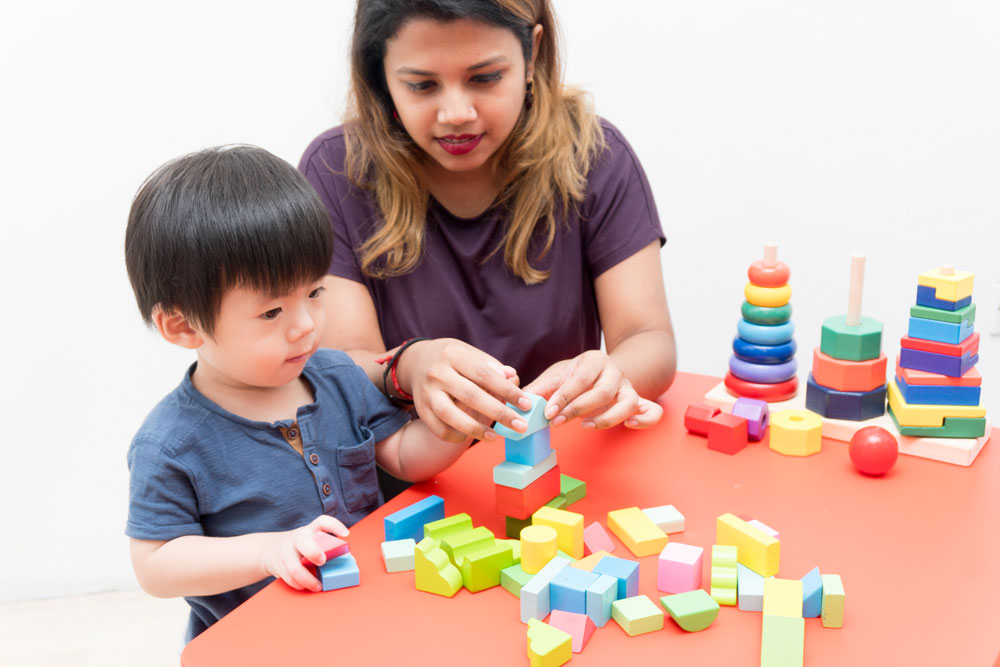Global Developmental Delay in Children

What is global developmental delay in children? Children normally will meet developmental milestones at similar rates, with it being not uncommon to hit some milestones before others. As for children with global developmental delay (GDD), they typically will have delays in two or more developmental areas, across speech and language, social, cognition, play and motor skills. They will usually seem much “younger” than their peers of the same age due to this delay. Some children with GDD may also be diagnosed with Autism Spectrum Disorder (ASD) in the future, but it is not always the case.
GDD affects children by limiting their ability in:
- Understanding and retaining information
- Problem solving
- Interpreting social cues and social awareness
- Responding appropriately to others
- Gaining personal independence and self care skills
- Navigating their environment through movement (gross and fine motor skills)
- Interacting and playing with their same aged peers

How does Global Developmental Delay affect a child’s learning?
Children suffering from GDD tend to have a delay in acquiring new skills in their early years, along with lacking the foundational skills to learn which will take them a long time to acquire in comparison to their peers. They will often require intensive and additional support in their education to help them learn new skills and at a faster rate to catch up with other children.
It is important to note that every child’s impact of their GDD is different and it is crucial to conduct a comprehensive assessment to understand what the current level of your child’s skills are, along with their strengths and weaknesses. Due to a child’s brain’s ability to change and adapt is the strongest at the young ages of 0-3 years, it is highly recommended that early intervention be started as soon as possible once GDD is suspected or diagnosed to get the best possible outcomes for your child. At older ages, the intervention programs will still be effective, but earlier intensive treatments will provide more positive outcomes.
Speech therapy, occupational therapy, and ABA (Applied Behaviour Analysis) are the common treatments and components of early intervention programs used to support a child with GDD, all of which are provided at FIT-IN. Parents and caregivers are also provided with support, via educating them with training, tools and strategies to help their child meet development goals in the early intervention program. This is a crucial step as the parent will be able to spend the most time with the child and are fundamental to their success.
Contact our team of experienced professionals at FIT-IN who will be able to conduct assessments if you suspect your child has GDD, we also provide custom tailored early intervention plans that suit your child’s developmental needs and comfort, or if you have any questions surrounding global developmental delay in children.
FAQ
- When should I be concerned about my child’s development and consider GDD?
- If you notice significant delays in your child’s development, such as not meeting age-appropriate milestones in areas like motor skills, speech, or social interactions, contact our team of professionals at your nearest branch for an assessment.
- What does early intervention involve for Global Developmental Delay in children?
- Early intervention programs focus on providing individualized support to address developmental delays. This may involve a combination of therapies, educational strategies, and family involvement to promote the child’s overall development.
- How can I support my child at home if they have GDD?
- Collaborate with therapists and educators to implement strategies at home that reinforce skills learned in intervention sessions. Create a supportive and structured environment, and seek guidance on age-appropriate activities to enhance development.
- Will my child with GDD catch up to their peers eventually?
- The trajectory varies for each child. With early intervention and ongoing support, many children with GDD can make significant progress and improve their developmental outcomes. However, the pace of progress may differ for each child.
- What long-term considerations should I keep in mind for my child with GDD?
- Long-term planning involves ongoing monitoring of your child’s progress, adjustments to intervention strategies, and collaboration with educators to ensure appropriate educational accommodations and support.
- Can Global Developmental Delay in children be treated or managed?
- While there is no specific cure for GDD, early intervention is crucial. Interventions may include therapies like ABA therapy, speech and language therapy, and occupational therapy, tailored to address the specific developmental challenges observed.
-
-
-
Contact Us
Cyberjaya
FR-02-08 & FR-03-08, Tamarind Suites,
Persiaran Multimedia, Cyber 10,
63000 Cyberjaya, Selangor
+6 018-388 3590
Senior Centre Manager – Mr Shafiq
+60 11-1153 6388
Therapist – Mr Hong
Bukit Jelutong
No 7-1, Jalan Ungu B U9/B,
Sunway Kayangan, Section, U9,
40150 Shah Alam, Selangor
+60 18-664 6074
Centre Manager – Ms Yee
+60 11-1152 6074
Assistant Manager – Ms Anis
Bandar Menjalara, KL
59-1 Jalan Medan Putra 1,
Medan Putra Business Centre,
52200 Kepong, Kuala Lumpur
+60 11-1153 6388
Senior Centre Manager – Mr Chu
+60 11-1152 6074
Assistant Manager – Ms Anis
Eco Majestic, Semenyih
12A-2, Jalan Eco Majestic 10/1D,
Eco Majestic, 43500 Semenyih,
Selangor
+60 11-1138 8359
Centre Manager – Mr Zan
+60 11-1168 6074
Senior Therapist – Ms Adda
Eco Santuari, Telok Panglima Garang
2A-1, Jalan Eco Sanctuary 8/1A,
Eco Santuari, 42500 Telok Panglima Garang,
Kuala Langat, Selangor
+60 11-1168 6074
Senior Therapist – Ms Adda
+60 11-1153 6388
Therapist – Mr Hong


 Book Assessment
Book Assessment